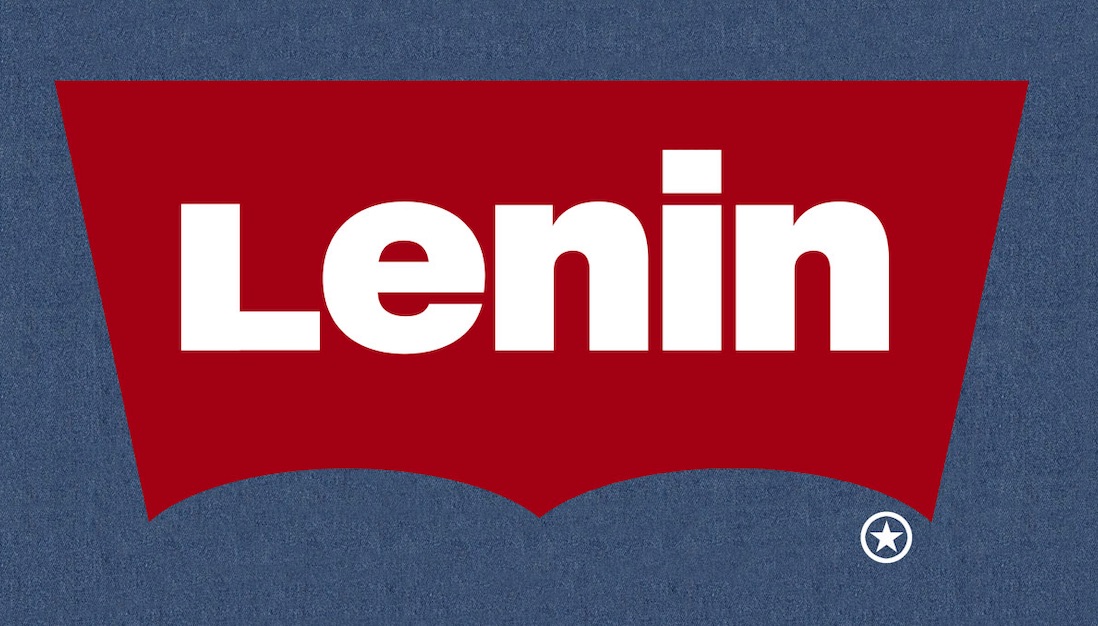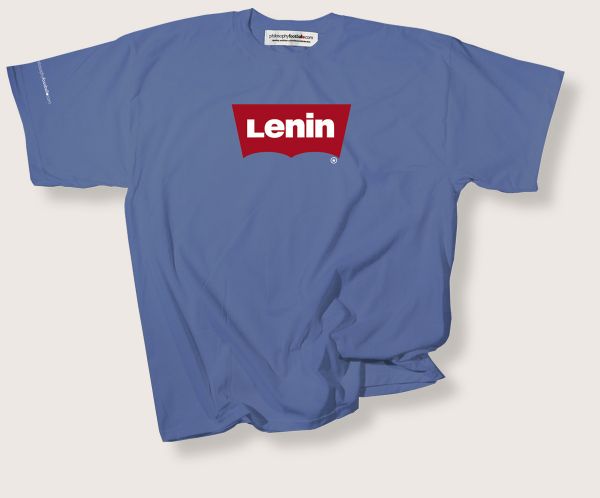
Lenin, Levi's and Subvertising a Centenary
13.01.24
Philosophy Football's Mark Perryman offers his blue jeans vs red October dialectic(ish)

In terms of a twentieth century victory and defeat the 1917 Russian Revolution is pretty much epic. Alongside the rise and eventual fall of Nazi Germany it shaped a century that the historian Eric Hobsbawm described as the "age of extremes". This was a totalising politics that for a lot longer than just ten days shook the world. Lenin’s What is to be Done? is a question not a catechism, but to deny the capacity of 1917 and all that to inspire a movement for change, on a global scale, of unprecedented size and impact. Well, if that’s not ahistorical I don’t know what is.
In 1984, ten years prior to founding Philosophy Football me and Hugh Tisdale quite independently, we didn't know each other back then, visited the exhibition Art into Production. This showcased Soviet textiles, fashion and ceramics in that all too brief period, 1917-1935 before Stalin, and Stalinism, bastardised the entire meaning of the Russian Revolution to horrific ends. The vivid colours, the use of plates and clothing, the imagination, joyfulness and pleasure of producing, wearing, using these objects of socialist desire was quite unlike anything either of us had seen before. And tucked away in the exhibition catalogue a rationale was provided for this particular version of a brave new world.
The Young Communists of 1928 had asked themselves not ‘what is to be done?’ But 'What do we want from a plate?’ Blimey, this was a cultural politics of practical production I was entirely unused to. “We want it to be right for its purpose, that is for serving food, we want it to be of good quality and style. These are the first requirements of an ordinary china plate.” Forward to the potteries comrades! But of course, they also recognised that churning out cheaper, better dinner plates than whatever Russia’s early twentieth century equivalent of John Lewis might be wasn’t enough, not nearly enough.
Rather they implored that these plates have “a cultural, educational and organising influence.” Now correct me if I’m wrong but I’ve scoured the John Lewis tableware range and I can’t find a single product offering any such influence. In contrast out of history I'd come across an unfamiliar example of revolutionary promise proffered, something that could never be entirely commodified, a meaning and purpose compromised out of all meaning and purpose.
The Young Communists’ manifesto for plates, cups n’ saucers too, explained the contrast to what they characterised as ‘non-resistance’:
“In this ‘parade’ of objects there are no non-combatants – nor can there be! Plates and cups, things we see daily, several times a day, which can do their bit for the organising of our consciousness – these occupy an important place.”
For the 1917 Russian Revolution centenary, to do our bit for the organising of consciousness we reproduced a number of these original plate designs. We promptly sold out, I'm not sure how much consciousness we organised mind.
Now for the centenary of Lenin's death, 21 January 1924, we've turned Lenin into the ultimate symbol of capitalism vs communism, Levi's jeans. Really? Those of a certain age, and politics, will well remember that for generation after generation of dissenting Soviet youth their badge of rebellion was a pair of Levi's jeans somehow smuggled into the country.
During this period, again for those of a certain age and politics, arguments would rage. Was the Soviet Union 'actually existing socialism' or 'state capitalist' or a 'degenerate workers state' Never mind, in 2024 any such arguments are pretty much settled. The USSR neither no longer actually existing nor is today's Russia socialist, never mind the state bit its capitalist through and through, and degenerate too.
And those jeans as a sign of rebellion? Absolutely everywhere, alongside those three universal symbols of any modern consumer society. The Nike swoosh, the McDonald's golden arches, and that brown sticky liquid which rots our teeth and makes us fat. Putin in charge and the oligarchs raking it in, not to mention the war with Ukraine few would argue the now global reach of capitalism is entirely for the betterment of all.
So, what of Lenin 100 years on? Lenin's death followed by Stalin didn't end well, and that's putting it mildly. The free-flowing imagination and creativity of those beautiful plates and cups replaced by the strictly instrumental and narrowly formulaic of socialist realist art. A one-party state, show trials, purges and Gulags. The Ribbentrop-Molotov pact. Soviet tanks crushing the Hungarian revolt in 1956, and then again crushing the Prague Spring of 1968.
And in 1991 the defeat of Gorbachev's reform communism to be replaced first by Yeltsin, then Putin. It's a sorry tale of bloodied disappointment with not much at all, if anything, to celebrate.
But perhaps those young communists with their cups and plates were on to something, bright and beautiful, original and inspirational, full of hope. Who are we with a world teetering on the verge of envirionmental breakdown to dismiss all that? Hope that across Britain in the1930s inspired hunger marches against unemployment. Hope that mobilised London's East End to stop Mosley's blackshirted fascists at Cable Street. Hope that inspired thousands from across Europe, the USA and Canada to sign up for the International Brigades and travel to Spain in defence of the Republic against the fascist Franco. And after Stalingrad the hope across the entire world that the Red Army could defeat Hitler, which they did.
Hopes, each in their different ways, disappointed, but they existed for a reason, a good reason. In the old-fashioned language of Marxism, a dialectic, or in other words high hopes vs crushing disappointment, they're inter-related. Thus, our Levi's Lenin centenary design subvertising Communism vs Capitalism is a dialectic too. We think Vladmir Ilyich would approve.

The Centenary Lenin Levi's T-shirt is both strictly unofficial and exclusively available from Philosophy Football here
Mark Perryman is the co-founder of the self-styled 'sporting outfitters of intellectual distinction' akaPhilosophy Football